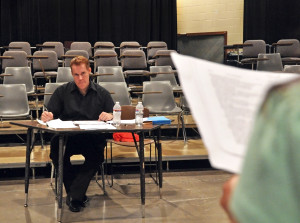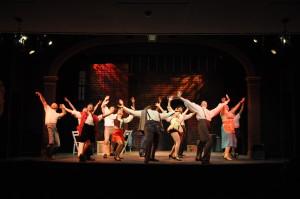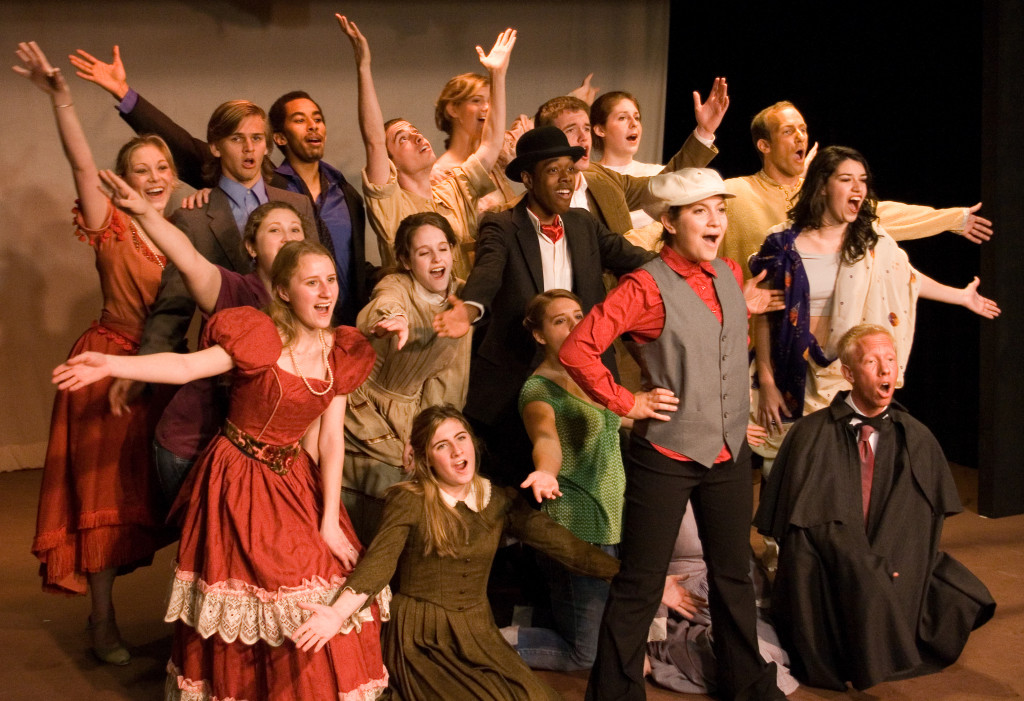In the fifth post in her series on producing your own show, Kimberley Andrews sheds some light on casting: how do you go about finding actors? What should you expect from them? What are the pitfalls of asking people to work for free?
Firstly, lets assume you and your director have agreed you’ll have some input in casting your show (see my previous post for more on what you should agree on with your director before you start). What next then? Where will you go to find lovely actors and how on earth will you get them to work with you?

In my last post, I mentioned how tough it can be to find actors who are willing, available and happy to work on your play, especially if you graduated a while back or you’re new to the theatre. I was lucky in that I’d already put on a few showcases as part of a writers group, so I had access to some trusted actors who were willing to work with me. (Sorry to mention the dreaded networking thing again but this is where crawling out from behind your laptop and venturing into the outside world really does work wonders.)

Schmoozing aside, if you want to cast your show without sending yourself mental, the best thing you can do is be flexible (especially if you’re not paying people). I know, I know – you absolutely need an accurate Harry Styles look-a-like for your One Direction comedy-drama but a relentless pursuit to find someone who fits your exact vision can make your already narrow options narrower than Harry’s skinny jeans (unthinkable, I know). Oh, and you might come across as a total loon and put people off working with you…which is bad.
Of course, that doesn’t mean it’s wise to abandon all casting requirements and lunge at the first actor who shows an interest. If your protagonist is a 60 year old man, then in all fairness, you probably shouldn’t cast a 12 year old girl in the role. But, differentiating between what’s essential for the piece work and what you’d do in an ideal world will save you a lot of stress (and disappointment) in the long run.
Since I was producing a sketch show, it was far more important for me to find a good ensemble of actors who could play multiple roles than say, actors who could do a perfect Black Country accent (which was where my piece was set, in case you thought that was a peculiar thing to make actors do…).
In terms of finding actors, I sat down with the director and we made a list of people to approach. We started with people we know, who had proven themselves reliable and talented: starting with actors from the showcases we’d done, we also contacted friends, people who’d worked on friends shows and old course-mates who were now working as actors.
But that doesn’t mean you have to have already have contacts to make this happen – there are plenty of alternatives for finding talented actors. (Although certain demographics, i.e. that 60 year old man I mentioned, may always be tricky.)
Here are my top ways to find actors if you don’t already have the contacts:
1. Approach drama schools – but don’t be surprised if they tell you to sling your hook if you ask about working with current students who are busy with classes – your best bet is find out who deals with alumni and ask them to forward the casting call to their alumni email list.
2. Put ads out on casting websites – Casting-Call Pro, Spotlight, and Arts Jobs are a good place to start.
3. Use social media – putting a call out on Facebook/ Twitter can be a great way to find people to work with you. I’ve had some brilliant recommendations from Facebook friends who have put me in touch with their actor mates. You could also start building your network by following theatre-types on Linked In/ Twitter/ Facebook.
I found that sourcing actors was a mish-mash of sending lots of emails, making calls, sending out scripts… and then finding out people weren’t available when you needed them and going back to square one. The key thing is not to be disheartened by these setbacks. After all, it’s worth remembering that you’re asking a huge favour of people so expect to put in a bit of leg-work to make things happen.

I didn’t do anything like formal auditions with the actors I found; since nearly all of them were people I knew or were recommended by friends, an email conversation or a quick coffee was enough to seal the deal. (It’s also kind of rude to ask such a big favour of someone and then demand they perform their best Shakespeare speech for you.)
Of course though, there is a place for auditions and if you’re putting  up an advert for actors rather than working by recommendation, you’re going to want to do some sort of screening – even if it’s just a read of a couple of scenes of your play. But if you’re asking people to work for free, it’s about making it clear that your auditions are a mutual thing to see whether they’re a good fit for your role, rather than you assessing their talent like you think you’re the next Simon Cowell.
up an advert for actors rather than working by recommendation, you’re going to want to do some sort of screening – even if it’s just a read of a couple of scenes of your play. But if you’re asking people to work for free, it’s about making it clear that your auditions are a mutual thing to see whether they’re a good fit for your role, rather than you assessing their talent like you think you’re the next Simon Cowell.
What to do when things go wrong…

I hate to be the bearer of bad news but even when you’ve cast your show, things can go wrong! For me, DISASTER STRUCK a week before the show, when my lead actor got paid work and off he went. Then another realised she had too many other commitments and pulled out. Then, the guy I found to replace the lead decided he was far too handsome to play the role. Yeah, seriously.
How can the world be such a cruel place, you ask?! Well, it’s an unwritten rule that if any actor gets paid work, they’re well within their rights to ditch you. If they’re nice, not busy and love what they do, the chances are they’ll jump at the chance to do your show. But they’d have to be a bit bonkers or very rich (and still bonkers) to turn down paid work to do your free stuff. When asking people to work for free, it’s a risk you take that they might get a role in Eastenders and saunter off in the direction of Walford and there’s nothing you can do about it. In fact, if you’re a reasonable person, you should probably even be a little bit pleased for them…

So, with only a week before the show, and two actors down, I was panicking. The first thing I did was let out a blood curdling scream, obviously, followed by calling anyone who I thought might be able to help. In the meantime, another writer who was contributing a sketch whipped up a monologue that she could perform herself if need be. Having back up material is easy if you’re doing a sketch show but obviously not an option if you’re producing a play; I guess the way round it in this case is to consider your options: can you double up on a character? Can you just perform extracts? It’s not ideal, but the show must go on as they say.
The director eventually managed to save me from the depths of despair by calling in favours from a couple of friends and believe it or not things did work out well in the end. I ended up with talented actors who weren’t worried about being too good looking for the roles and were even willing to have a bash at the Black Country accent. When you find actors like this, you need to hold on to them with both hands – not literally of course, but be nice to them, don’t expect them to rehearse ridiculous hours, don’t keep editing the scripts in mad fits of creative despair and do remember to say thanks.
Here are my 10 tips for avoiding a casting disaster…
- Build a network of actors before you start (if you can) by attending writers groups or doing a course. Or, co-produce with someone who does have an extensive network.
- Think twice about producing a piece with a large cast: the fewer actors you need to find, the better. Remember, you’ll need to rehearse at times that suit everyone – which is harder with more people.
- Make sure your work is at its best (and is ideally finished) when you send it out to actors; they aren’t going to be crazy about performing a piece that isn’t very good, nor will they thank you if you keeping chopping and changing at the last minute.
- Be realistic about the size of the project: you want actors learn a 500 hundred page script in the space of two weeks? Think again. If your piece is long, think about presenting it as a reading instead.
- Don’t get too hung up on perfect casting. So you wanted someone who looks exactly like Leonardo DiCaprio to play your lead role? It’s probably not going to happen – if you can get someone the right gender, and in right age range who wants to do your show, then think yourself lucky. The important thing is that they are good and are committed to the project.
- Be flexible with rehearsal times and expectations. Obviously, you want the end result to be polished but if you ask too much, you run the risk of people dropping out.
- Be nice! If you’re working all day and everyone dashes out to Pret in a ravenous frenzy, try and stretch to buying them a sandwich. Or take in some biscuits. Or buy them a pint at the end of a long day. At the very least, smile at them.
- Thank actors repeatedly. Not so much that you seem creepy and insincere but enough to show you really are grateful.
- Do have a back-up plan for if someone drops out at the last minute: keep a note of any actors who were interested in the role, have back-up material if possible and keep any actor friends you have close by! (See suggestion #1.)
- Don’t be a drama queen/king: the course of making theatre never runs smoothly but try and take it in your stride and remember that things usually do work out in the end.

Previous Posts: Part 1: Getting Started, Part 2: Finding a venue, Part 3: Budget & Profit Part 4: Building your Team
In the next post, I’ll be talking about how you can organise your cast of glorious actors in rehearsal – how much time to spend on it, and how to go about finding rehearsal space.


Pingback: How to produce your own work – part 6: Rehearsals | LONDON PLAYWRIGHTS BLOG